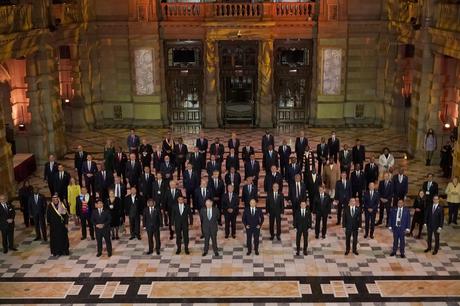
The Glasgow Climate Pact, the title given to the document endorsed at COP26 by world leaders, seen above, demonstrates a worrying gap between what science is telling us and what (some) countries are ready to do in terms of climate action
Just like during the pandemic where politicians and citizens were asked to "listen to the science", so too with the ecological and climate emergency.
The Intergovernmental Panel on Climate Change (IPCC) released its latest report in August this year. The summary for policymakers alone is 26 pages long.
To measure this change that is actually happening, it uses a mixture of scientific measurements of the environment, such as temperature, the composition of gases in our atmosphere, and the frequency of severe storms and heat waves.
Using a mix of advanced models, different scenarios are explored to model the climate that has been observed historically. These sophisticated models take into account both human sources of warming and natural sources of warming.
When humans' contribution to warming is incorporated into these models, they can then better predict how our climate has warmed. Human sources of warming include emissions of gases like carbon dioxide, methane, and nitrous oxide, called greenhouse gases.
These gases, when released on a large scale, influence the composition of the atmosphere and create a greenhouse effect that leads to global warming. In contrast, known natural sources of warming include solar radiation (heat from the sun) and volcanic activity.
When models only include natural sources of warming, they cannot capture the temperature change we are currently seeing happening. It is only when human and natural sources of warming are incorporated into models that they capture past warming trends. This is a summary of the scientific evidence for human-induced global warming and climate change.
However, the Glasgow Climate Pact, the title given to the document adopted at COP26, demonstrates a worrying gap between what science tells us and what (some) leaders and countries are ready to do on climate action.
On reading the Covenant, there is a stark contrast between the language used in the scientific sections and the rest of the document.
In these scientific sections, we find language that is not usual in such diplomatically negotiated documents, including terms such as "Science and emergency", "Expresses the concern and the greater concern that human activities have caused. a warming of around 1.1 ° C to date "," Notes with deep concern ".
In disciplines with stilted scientific writing standards, this amounts to scientists screaming at the top of their lungs that humanity is not on the right track to recognize the dangers ahead, and that a serious course correction is needed. desperately needed.
This is why many were bitterly disappointed with the outcome of the conference - its failure to "phase out" coal, oil and gas - the main causes of greenhouse gas emissions.
Arguably this was because the largest delegation to the conference was not a country, but rather the fossil fuel industry.
Since the science is clear, that we need to move away from fossil fuels as quickly as possible, the lobbying power of the coal, oil and gas sector was evident in the result. Let us not forget also the role played by the major carbon energy exporting countries like Australia, Russia and Saudi Arabia, and the big coal users like China and India.
It has been argued that the 2020s must be a decade of action, innovation in research, enabling nature to recover to play a role in mitigating carbon emissions, while creating a sustainable economic recovery. after the pandemic. COP26 makes the efforts to decarbonise our economies much more difficult.
Finally, we must recognize the climate deniers, refusing to accept that climate change is the result of human activity. Like the countries and the fossil fuel lobby mentioned above, they will need to see for themselves in the eyes of those facing the immediate impacts of climate change and of future generations.
Those from the Global South, whose voices were heard so eloquently at COP26, will face suffering and death (called "loss and damage" in the polite language of international diplomacy) in the years to come. to come. As academics and scientists, we have not used these terms lightly.
Likewise, we see 'climate delayers' who warn of urgent action now and support less ambitious climate action. It's the equivalent of finding your house on fire but letting it burn harder so you can better see what you are not doing. Climate delay is perhaps the new climate denial.
Climate science has spoken, but so have people, those protesting outside the conference demanding ambitious climate action, and indeed history can record that it was those outside the negotiations and not inside who had. both science on their side and were on the right side of history.
* John Barry is Professor of Green Political Economy at Queen's University Belfast and Mark Emmerson is Professor at the Institute for Global Food Security at QUB A message from the editor:Thanks for reading this story on our site. While I have your attention, I also have an important request for you.
With coronavirus lockdowns having had a major impact on many of our advertisers - and therefore the revenue we receive - we are more dependent than ever on your getting a digital subscription.
Subscribe to newsletter.co.uk and enjoy unlimited access to the best Northern Ireland & UK news and information online and on our app. With a digital subscription, you can read more than 5 articles, see fewer ads, enjoy faster load times, and access exclusive newsletters and content.
Our journalism costs money and we rely on advertising, print and digital revenues to support them. By supporting us we are able to help you provide reliable and verified content for this website.

